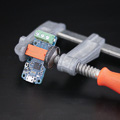Automating YoctoHub configuration
![]() YoctoHubs allow you to make available any Yoctopuce module from an Ethernet or Wifi network. This enables you, for example, to use several temperature sensors in distinct buildings. However, before you can access a YoctoHub through the network, you must first configure its network parameters. You can use the VirtualHub or our command line tools, but this week, we are going to see how to automate this step using our libraries.
YoctoHubs allow you to make available any Yoctopuce module from an Ethernet or Wifi network. This enables you, for example, to use several temperature sensors in distinct buildings. However, before you can access a YoctoHub through the network, you must first configure its network parameters. You can use the VirtualHub or our command line tools, but this week, we are going to see how to automate this step using our libraries.
| No comment yet | Read more... |
Yocto-Visualization, a free visualization app
![]() We have a present for you today. It's something that people have been regularly asking for, despite our best efforts to be as clear as possible that Yoctopuce doesn't provide ready-to-use solutions. In the end, we decided to make a small exception:-) and to give you an application to easily visualize the values measured by Yoctopuce sensors. If you work under Windows, you will be able to display graphs, indicators, and other gadgets in a few clicks. Follow the guide...
We have a present for you today. It's something that people have been regularly asking for, despite our best efforts to be as clear as possible that Yoctopuce doesn't provide ready-to-use solutions. In the end, we decided to make a small exception:-) and to give you an application to easily visualize the values measured by Yoctopuce sensors. If you work under Windows, you will be able to display graphs, indicators, and other gadgets in a few clicks. Follow the guide...
| 21 comments | Read more... |
A connected smoke detector
![]() The usual method to detect smoke consists in measuring the reflection of a light beam on the smoke particles suspended in the air. Although we don't explicitly have a smoke detector in our product catalogue, we recently started offering a product which can be used for this: the Yocto-RangeFinder. Indeed, this sensor uses exactly the same principle for its main feature (distance measurement) and can therefore easily be used as USB smoke detector, or even as a networked smoke detector.
The usual method to detect smoke consists in measuring the reflection of a light beam on the smoke particles suspended in the air. Although we don't explicitly have a smoke detector in our product catalogue, we recently started offering a product which can be used for this: the Yocto-RangeFinder. Indeed, this sensor uses exactly the same principle for its main feature (distance measurement) and can therefore easily be used as USB smoke detector, or even as a networked smoke detector.
| No comment yet | Read more... |
Performance improvement of our API
 This week, we are going to talk again about our programming libraries, to announce a good news: We added an optimization which reduces running time by about 40% and splits by half the quantity of transferred data.
This week, we are going to talk again about our programming libraries, to announce a good news: We added an optimization which reduces running time by about 40% and splits by half the quantity of transferred data.
| No comment yet | Read more... |
How to get started in C# with Yoctopuce modules
![]() This week, we show you how to make a Windows application using Yoctopuce modules, in C#. The exercise is interesting because most C# examples provided with the Yoctopuce API are actually console applications. Windows Forms applications introduce some small differences which you should note. Note also that this post doesn't pretend to teach you C# programming. You are supposed to have some knowledge of it already :-)
This week, we show you how to make a Windows application using Yoctopuce modules, in C#. The exercise is interesting because most C# examples provided with the Yoctopuce API are actually console applications. Windows Forms applications introduce some small differences which you should note. Note also that this post doesn't pretend to teach you C# programming. You are supposed to have some knowledge of it already :-)
| No comment yet | Read more... |
1 ... 10 ... 20 ... 30 ... 40 ... 50 ... 60 ... 70 ... 80 ... 87 88 89 90 91 92 93 94 95 96 97 ... 100 ... 110 ... 120 ... 130 ... 140 ... 150 ... 152


